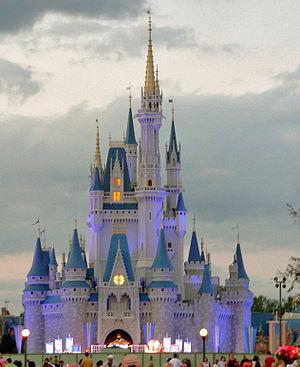
The first time I went to Disney World I asked my husband why everyone was hugging the giant chipmunk. We were dating at the time and I think he seriously wondered how many grey cells were present in the woman he had fallen in love with.
For weeks we talked about going to Florida. It was September and we had dated since early January of that year. This trip was a big one, for it would be the first time I would meet his parents and interact with his family. And we would go to the Magic Kingdom — Disney World! A place my husband had been to many times as a kid who spent his high school years in Florida.
And so we made the trip, flying into Florida just when leaves begin to change to a brilliant autumn-gold in the north but summer remains in the south. As promised, we got up early one day and drove to Orlando to stand in line and go the that ever Magical Kingdom – Disney World. It was the ideal time to go. Lines were short, kids were back in school, and the weather was high eighties, sunny, with not a drop of humidity – perfect.
To say I was out of my comfort zone is a grave injustice to that zone. I was like a martian on earth. I was jello and everyone else was crème brûlée. I was fuchsia and everyone around me was blue.
And then a giant chipmunk comes up to the crowd and people start hugging him. “Why is everyone hugging the giant chipmunk?” I said to my now-husband.
He looked blank-faced.
Wait. You don’t know who the chipmunk is?
It was then that I learned that valuable lesson of Chip & Dale, Micky & Minnie, Bambi & Faline, Lady & the Tramp, Dumbo and so many more. Characters and images that kids my raised in the United States knew by heart. Disney took off on television during my childhood through Sunday Night Disney so my contemporaries were well-versed in the magic of these characters and their escapades.
I was not.
There was a glaring gap in cultural understanding, cultural illiteracy blatantly exposed through the Magic Kingdom.
There are many more funny examples of this cultural illiteracy. From popular TV shows to idioms, it is fair to say I was five years behind pop-culture. Initially it was funny. Truth is, I’m not sure when I suddenly found it a deficit instead of being able to see the humor of these cultural gaps. Because for years I laughed them off, seeing them for what they were – simply gaps based on a different upbringing.
Then suddenly later in adulthood they became deficits that signified insecurity and a character flaw. Is it because I was back in the states raising TCK’s of my own? Is it because I was suddenly uneasy in my skin, no longer able to claim I was ‘from’ Pakistan or Egypt, knowing that my residency at the time included a Victorian home in an all-white town?
I’m not sure. Probably all those things and more. I think I learned that cultural difference, long enjoyed by me, was not enjoyed by everybody. In fact, I found many that perceived cultural differences to be threatening, to jeopardize their safety and belonging.
In the past few years I’ve begun to laugh again, laugh at the gaps, laugh at the misunderstandings, enjoy remembering some of the glaring errors I’ve made in cross-cultural living. Instead of silencing these, I found venues for stories and illustrations – places where the narratives mean something and lead toward better understanding, if not agreement.
It is a giant step forward, as big as that giant chipmunk.
What about you? What’s your experience with information gaps and cultural illiteracy? Can you laugh about it or does it cause insecurity and angst?

